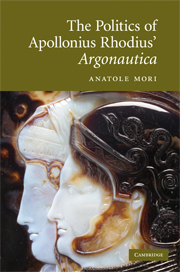Book contents
- Frontmatter
- Contents
- List of tables
- Acknowledgments
- List of abbreviations
- 1 Introduction
- 2 The politics of Alexandrian poetry
- 3 Strife and restraint among the Argonauts
- 4 Sexual politics in Lemnos, Colchis, and Drepane
- 5 Piety, mediation, and the favor of the gods
- 6 The bones of Apsyrtus
- 7 Quid denique restat: Apollonius and Virgil
- Bibliography
- Index
5 - Piety, mediation, and the favor of the gods
Published online by Cambridge University Press: 22 September 2009
- Frontmatter
- Contents
- List of tables
- Acknowledgments
- List of abbreviations
- 1 Introduction
- 2 The politics of Alexandrian poetry
- 3 Strife and restraint among the Argonauts
- 4 Sexual politics in Lemnos, Colchis, and Drepane
- 5 Piety, mediation, and the favor of the gods
- 6 The bones of Apsyrtus
- 7 Quid denique restat: Apollonius and Virgil
- Bibliography
- Index
Summary
Cult models and poetic mirrors
As the last two chapters have shown, the depiction of character in the Argonautica revises Homeric behavioral patterns, largely in response to contemporary historical models, or rather to the ideological implications of those historical models. The resolution of political tension during several episodes promotes a cooperative ideal that reworks both the strife of Iliad 1 and the conflicts in Alexander's army, while the foregrounding of influential female characters alludes to Homeric figures like Arete as well as to the political role, official or otherwise, of Ptolemaic queens. Jason's cloak, moreover, is a symbol of political authority that recalls not only the shield of Achilles but also the iconography of Alexander, like the “sweet sweat” and linen band of Posidippus’ epigram. But it is the Argonauts’ formal contact with the gods, more than any other feature of the Argonautica, which brings the poem in line with its contemporary political context. Like their Egyptian predecessors, the Ptolemaic kings acted as intermediaries between their subjects and the gods; so, too, the epic leader is imagined as the principal link between the divine and mortal spheres. Although the poem draws attention to the Argonauts’ shared responsibilities, Jason's ritual activity stands out as exceptional. It is Jason who plays the central role in a greater number of important episodes, such as the night sacrifice to Hecate (3.1191–224) and the noon apparition of the Herossae (4.1305–36).
- Type
- Chapter
- Information
- The Politics of Apollonius Rhodius' Argonautica , pp. 140 - 186Publisher: Cambridge University PressPrint publication year: 2008



